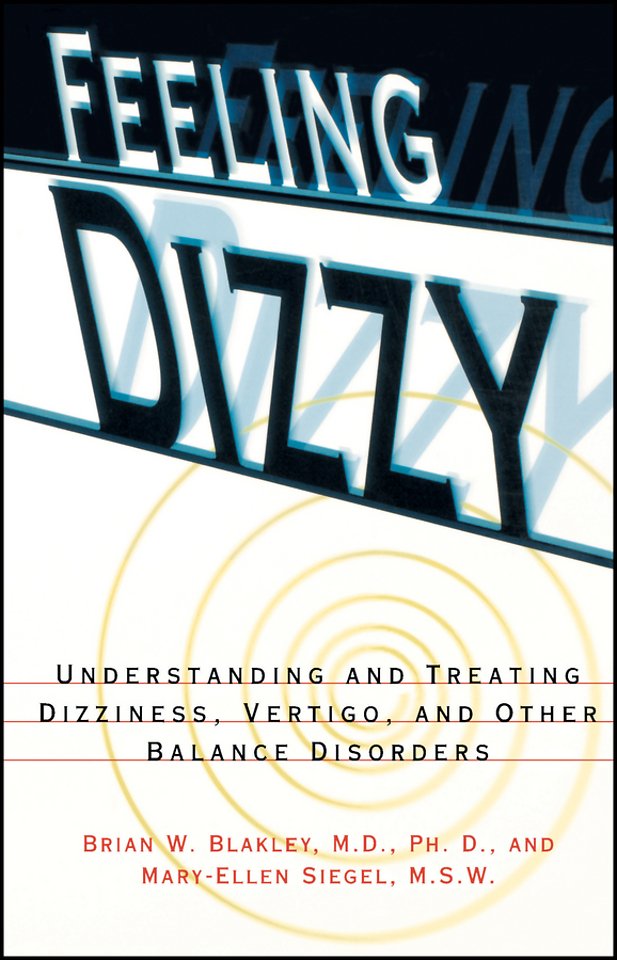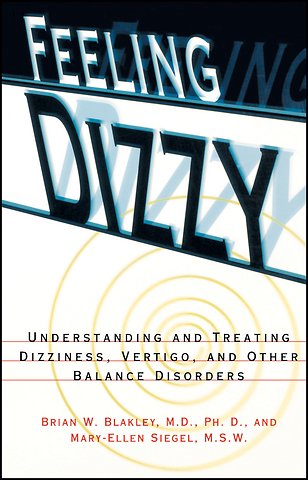Feeling Dizzy
Understanding and Treating Vertigo, Dizziness, and Other Balance Disorders
Samenvatting
When you turn your head suddenly, do you feel sick to your stomach?
Do you often become dizzy when you get up too quickly from a chair?
Have you ever felt a sense of motion when you′re standing still?
You′re not alone. Whether it′s fainting, imbalance, or spinning sensations, these disorders affect 76 million Americans at some time in their lives. Feeling Dizzy explains what can go wrong, what physicians can do to diagnose and treat problems, what you can do to help yourself, and how you can finally regain your sense of balance. The first complete book on the subject written from the general reader, Feeling Dizzy:
Identifies and explains the three types of dizziness: vertigo, imbalance, and fainting.
Describes treatment options, from medication or surgery to therapy and rehabilitation.
Outlines self–help options, including relaxation techniques, biofeedback, and exercise.
Specificaties
Inhoudsopgave
<br />
<br /> PART I: Dizziness: What Does it Mean?
<br />
<br /> Introduction.
<br />
<br /> 1. The Balancing Act.
<br />
<br /> 2. Feeling Off–Balance.
<br />
<br /> 3. Finding the Cause of Dizziness and Vertigo.
<br />
<br /> PART II: The Causes of Dizziness.
<br />
<br /> 4. Peripheral Vestibular Disorders.
<br />
<br /> Benign Paroxysmal Positional Vertigo.
<br />
<br /> Vestibular Neuronitis.
<br />
<br /> Labyrinthitis and Other Ear Infections.
<br />
<br /> Perilymph Fistula.
<br />
<br /> Cholesteatoma.
<br />
<br /> Otosclerosis.
<br />
<br /> Trauma to the Ear.
<br />
<br /> Meniere′s Disease.
<br />
<br /> Recurrent Vestibulopathy.
<br />
<br /> Motion Sickness.
<br />
<br /> Height Dizziness.
<br />
<br /> 5. Central and Vascular Vestibular Disorders.
<br />
<br /> Acoustic Neuroma.
<br />
<br /> Other Brain Tumors.
<br />
<br /> Cerebral Atrophy.
<br />
<br /> Disorders of the Blood Supply.
<br />
<br /> Transient Ischemic Attacks.
<br />
<br /> Stroke.
<br />
<br /> Migraine.
<br />
<br /> Epilepsy.
<br />
<br /> Multiple Sclerosis.
<br />
<br /> Other Central Vestibular Disorders.
<br />
<br /> 6. Systemic Disorders.
<br />
<br /> Cardiovascular Diseases.
<br />
<br /> Bacterial and Viral Diseases.
<br />
<br /> Connective Tissue and Arthritic Problems.
<br />
<br /> Blood Disorders.
<br />
<br /> Diabetes.
<br />
<br /> Chronic Kidney Disease.
<br />
<br /> Thyroid Disorders.
<br />
<br /> Allergies.
<br />
<br /> Temporomandibular Joint Disorders (TMJ).
<br />
<br /> Medications and Other Substances.
<br />
<br /> 7. Dizziness and Anxiety.
<br />
<br /> Anxiety.
<br />
<br /> Phobias.
<br />
<br /> Depression.
<br />
<br /> Somatization.
<br />
<br /> Psychotherapy and Other Treatments.
<br />
<br /> PART III: Treatment for Dizziness.
<br />
<br /> 8. Medical, Dietetic, and Surgical Treatments.
<br />
<br /> Medication.
<br />
<br /> Diet.
<br />
<br /> Surgery.
<br />
<br /> 9. Therapy and Rehabilitation.
<br />
<br /> Team Approach to Rehabilitation.
<br />
<br /> Physical Therapy Exercises You Can Do at Home.
<br />
<br /> Relaxation Techniques.
<br />
<br /> Hypnosis.
<br />
<br /> Biofeedback.
<br />
<br /> Psychotherapy.
<br />
<br /> Helping Yourself.
<br />
<br /> Future Hope for Chronic Dizziness.
<br />
<br /> Appendix A. Helpful Sources.
<br />
<br /> Appendix B. Suggested Reading.
<br />
<br /> Glossary.
<br />
<br /> Index.
Net verschenen
Rubrieken
- aanbestedingsrecht
- aansprakelijkheids- en verzekeringsrecht
- accountancy
- algemeen juridisch
- arbeidsrecht
- bank- en effectenrecht
- bestuursrecht
- bouwrecht
- burgerlijk recht en procesrecht
- europees-internationaal recht
- fiscaal recht
- gezondheidsrecht
- insolventierecht
- intellectuele eigendom en ict-recht
- management
- mens en maatschappij
- milieu- en omgevingsrecht
- notarieel recht
- ondernemingsrecht
- pensioenrecht
- personen- en familierecht
- sociale zekerheidsrecht
- staatsrecht
- strafrecht en criminologie
- vastgoed- en huurrecht
- vreemdelingenrecht

